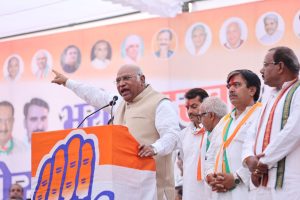In what is being labeled as a “dress rehearsal” before the 2024 general elections, five Indian states are voting in elections to state assemblies this month.
In three states — Chhattisgarh, Madhya Pradesh and Rajasthan — since the electoral battle is a straight bipolar contest between the Bharatiya Janata Party (BJP) and the Congress, the opposition INDIA bloc has taken a backseat. As for the other two states, in Telangana, the Congress is attempting to unseat the incumbent Bharat Rashtra Samithi; while in Mizoram, it is pitted against the ruling Mizo National Front and the Zoram People’s Movement.
Voting is scheduled on different dates between November 7 and November 30 in the five states, and votes will be counted on December 3.
The Congress’ unwillingness to hold INDIA alliance meetings while assembly elections are underway in these key states, where it has a sizeable presence, has miffed its alliance partners. Addressing a rally last week, Janata Dal-United (JD-U) chief and Bihar Chief Minister Nitish Kumar accused the Congress party of “preoccupation” with assembly polls and blamed it for the INDIA alliance not making much progress in recent weeks.
Responding to this public censure, Congress President Mallikarjun Kharge was quick to reach out to Nitish Kumar in a bid to scorch rumors of a rift in the alliance. Kharge reportedly assured Kumar that the Congress party was committed to the INDIA alliance and would resume discussions on the coalition’s strategies after the state assembly polls.
Incidentally, the first joint rally of the INDIA alliance, which was scheduled to be held in Bhopal in October, had to be canceled.
Madhya Pradesh Congress chief Kamal Nath alluded to the state unit being busy with poll preparations. Nath is desperate to form a government in the state after the BJP unseated him as chief minister in 2020. The BJP had lost the 2018 polls by a narrow margin after 15 years in power and worked behind the scenes to get Nath’s colleague, Jyotiraditya Scindia, to defect to the BJP. It then overturned the mandate to form the government with Shivraj Singh Chouhan as chief minister. Nath’s sole focus now is on winning back the state.
It was at the first meeting called by Kumar in Patna that the idea of an opposition alliance, which became the INDIA bloc, first emerged. Despite internal contradictions such as strong regional “satraps” (leaders) and parties who contest against each other in assembly elections, the parties declared they had come together to “save Indian Constitution and Democracy” from the Hindu supremacist BJP’s assault.
The Patna conclave was followed by meetings in Bengaluru and Mumbai, where alliance partners publicly stated they would be sitting down soon for seat-sharing talks. Those talks of seat-sharing for upcoming elections to the Lok Sabha, India’s lower house of parliament, have since been on hold, with the Congress busy with the assembly elections.
This has not gone down well with the other non-BJP parties.
In the meantime, Akhilesh Yadav of the Samajwadi Party, which has a strong presence in Uttar Pradesh, was keen to contest a few seats in the Madhya Pradesh assembly elections and wanted a tie-up with the Congress. The talks fell through. While Yadav castigated the Congress, Congress insiders admitted that they have too much at stake in Madhya Pradesh and cannot afford to gamble on assembly seats.
Senior political commentators argue that “Congress with its pan-India presence cannot be faulted. It cannot take its eyes off” Chhattisgarh and Rajasthan, where it is the incumbent, and Madhya Pradesh, where it is determined to avenge its humiliation by the BJP.
However, a disgruntled Samajwadi Party has made it clear that in Uttar Pradesh which is its stronghold, it is preparing to contest all 80 Lok Sabha seats on its own in the 2024 general election. Yadav said that any seat sharing with INDIA alliance partners will be decided later.
This public tug-of-war among INDIA alliance partners has predictably gladdened the BJP.
It must be highlighted that the rallying together of non-BJP parties on a common platform for the first time since 2014 has rattled Prime Minister Narendra Modi and the BJP. They trashed the coalition name INDIA, as one which reeks of a colonial hangover and said the BJP stands for “Bharat.” BJP leaders were quick to add Bharat to their Twitter bios.
Interestingly other INDIA alliance partners like Uddhav Thackeray’s Shiv Sena have spoken up in support of the Congress. “It is important for the Congress to win polls to stop the misuse of power,” the Shiv Sena said in its mouthpiece, Saamna, adding that its electoral victory would help the INDIA alliance.
Nonetheless, the slowing of the pace in the INDIA bloc’s strategizing has raised questions about its stability. But a veteran Congress functionary asserts that the Grand Old Party’s standing in the coalition itself will depend on its ability to pull off electoral victories in these key states.
Incidentally, it should be noted that the Congress successfully defeated the BJP and won Chhattisgarh, Madhya Pradesh as well as the Rajasthan assembly elections in 2018, but that did not translate into any gains for the party five months later in the 2019 general elections. The Congress managed to win only three of the 65 Lok Sabha seats in these three states.
For the INDIA bloc to make a meaningful impact in the 2024 Lok Sabha polls, alliance partners need to focus on working as a united front toward providing a credible alternative to the electorate to vote out the BJP, rather than getting bogged down in driving hard bargains in seat-sharing arrangements with each other.

































